Brian Clegg's Blog, page 53
June 23, 2016
How to alienate a chunk of your readership
 I've read a one of Hugh Aldersey-Williams books, and enjoyed Periodic Tales, and the Popular Science site has reviewed another,
Anatomies
, but I hadn't come across his 2015 title The Adventures of Sir Thomas Browne in the 21st Century and when coming across its existence in an interview with Aldersey-Williams in the Guardian, I was thinking about paying money to get hold of a copy, but then I came to this rather remarkable paragraph:
I've read a one of Hugh Aldersey-Williams books, and enjoyed Periodic Tales, and the Popular Science site has reviewed another,
Anatomies
, but I hadn't come across his 2015 title The Adventures of Sir Thomas Browne in the 21st Century and when coming across its existence in an interview with Aldersey-Williams in the Guardian, I was thinking about paying money to get hold of a copy, but then I came to this rather remarkable paragraph:While The Adventures of Sir Thomas Browne in the 21st Century was much praised, Aldersey-Williams now feels its message was missed by readers of popular science. “There’s no point in making ultra-subtle points about how science is done,” he says. “You have to bang them over the head with it. They want scientific facts and they want science explained to them, which I’m less and less interested in.”Frankly, I think that is profoundly condescending and insulting to the readers of popular science. The best popular science writing manages to give the reader both context and the science - Aldersey-Williams has never been particularly strong on the science, but because he finds science difficult to write about doesn't mean he should take it out on his readers. I think I will be giving his books a miss from now on.
Published on June 23, 2016 01:43
June 22, 2016
Pots, balls and the Reverend Bayes
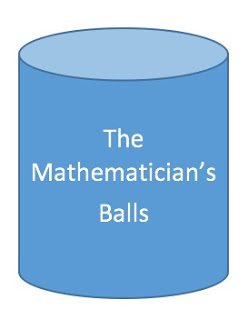 I'm reading a book called Bayes' Rule by James V. Stone for review, which has reminded me of the delightful case of the mathematician's coloured balls. (Mathematicians often have cases of coloured balls. Don't ask me why.)
I'm reading a book called Bayes' Rule by James V. Stone for review, which has reminded me of the delightful case of the mathematician's coloured balls. (Mathematicians often have cases of coloured balls. Don't ask me why.)This is a thought experiment that helps illustrate why we have problems dealing with uncertainty and probability.
Imagine I've got a jar with 50 white balls and 50 black balls in it. I take out a ball but don't look at it. What's the chance that this ball is black?
I hope you said 50% or 50:50 or 1/2 or 0.5 - all ways of saying that it has equal chances of being either white or black. With no further information that's the only sensible assumption.
Now keep that ball to one side, still not looking at it. You pull out another ball and you do look at this one. (Mathematicians know how to have a good time.) It's white.
Now what's the chance that the first ball was black?
You might be very sensibly drawn to suggest that it's still 50:50. After all, how could the probability change just because I took another ball out afterwards? But the branch of probability and statistics known as Bayesian tells us that probabilities are not set in stone or absolute - they are only as good as the information we have, and gaining extra information can change the probability.
Initially you had no information about the balls other than that there were 50 of each colour in the pot. Now, however, you also know that a ball drawn from the remainder was white. If that first ball had been black, you would be slightly more likely to draw a white ball next time. So drawing a white makes it's slightly more likely that the first ball was black than it was white - you've got extra information. Not a lot of information, it's true. Yet it does shift the probability, even though the information comes in after the first ball was drawn.
If you find that hard to believe, imagine taking the example to the extreme. I've got a similar pot with just two balls in, one black, one white. I draw one out but don't look at it. What's the chance that this ball is black? Again it's 50%. Now lets take another ball out of the pot and look at. It's white. Do you still think that looking at another ball doesn't change the chances of the other ball being black? If so let's place a bet - because I now know that the other ball is definitely black.
So even though it appears that there's a 0.5 chance of the ball being black initially, what is really the case is that 0.5 is our best bet given the information we had. It's not an absolute fact, it's our best guess given what we know. In reality the ball was either definitely white or definitely black, not it some quantum indeterminate state. But we didn't know which it was, so that 0.5 gave us a best guess.
One final example to show how information can change apparently fixed probabilities.
We'll go back to the first example to show another way that information can change probability. Again I've got a pot, then with 50 black and 50 white balls. I draw one out. What's the probability it's black? You very reasonably say 50%. So far this is exactly the same situation as the first time round.
I, however, have extra information. I now share that information with you - and you change your mind and say that the probability is 100% black, even though nothing has changed about the actual pot or ball drawn. Why? Because I have told you that all the balls at the bottom of the pot are white and all the balls at the top are black. My extra information changes the probabilities.
Published on June 22, 2016 00:24
June 21, 2016
In praise of throwing books away
 I'm going to attempt to be controversial, but I'm not very good at it.
I'm going to attempt to be controversial, but I'm not very good at it.I think people should consider recycling books if they don't want to keep them. And by recycling, I don't mean taking them to Oxfam or a second hand bookshop, I mean putting them in the recycling bin.
What a waste! Absolutely. Not green at all. But if people don't do this, there are two problems. One is the world will gradually choke with books as more and more come into the world and fewer and fewer ever leave the circuit. The other, more serious, concern is that if someone wants to read one of my books I would far rather they either bought a new copy or borrowed it from a library. In part this is because it means I can afford to live, and in part because if people don't buy new books (which are still incredibly good value compared with cinema, theatre, opera etc.) then publishers will go bust and there will be far less good quality reading available.
There are plenty of other things you can give to and/or buy from charity shops. But please don't make it books.
Published on June 21, 2016 00:55
June 20, 2016
The birth of Goldilocks
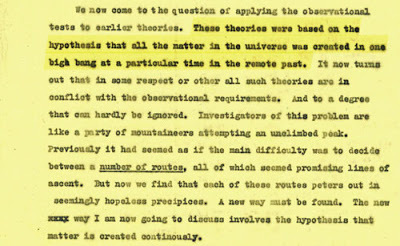 Fred Hoyle's script featuring 'big bang'
Fred Hoyle's script featuring 'big bang'(source St John's College, Cambridge)The origins of snappy terms for scientific events and concepts is sometimes very clear. We know, for instance, that English astrophysicist Fred Hoyle came up with 'big bang' in a BBC radio broadcast in 1949.
Others are somewhat less clear. Although many identify the American physicist John Wheeler as the originator of 'back hole' they appear to be incorrect - and we aren't sure who did coin the term. It seems to have been first used at at an American Association for the Advancement of Science meeting in January 1964, as a result of which it first appeared in print in a Science News Letter article by Ann Ewing. No one is sure who thought of it.
Another term that is popular these days that has some mystery over its origin is where Goldilocks came from. Not the children's story itself, but rather the idea of applying the 'not too hot, not too cold, just right' principle to the region around the Sun which can support water-based life - now often referred to as the Goldilocks Zone.
 Nope, that's not it
Nope, that's not it(source Wikipedia)The terms seems to have crept in during the 1970s, despite suggestions that have been made that it was down to the team of astronomer Donald Brownlee and paleontologist Peter Ward. However this pair wrote papers around the area in 2000/2001 - far too late to have originated the term, and also seem to have used the rather more frumpy Circumstellar Habitable Zone or CHZ. Similarly claims for Geoffrey W. Marcy, the disgraced American extrasolar planet discoverer, place it in the 1990s, which again is too late.
Perhaps the best lead we have is that science writer John Gribbin used the term (or to be precise, Goldilocks planet for the Earth) in the early 1970s when writing for X. At the time he thought that he had originated the term, but subsequently discovered it had been used earlier - only he can't remember by whom.
So, for the moment, the definitive origins of the term are a mystery. Perhaps someone has an earlier source hiding away somewhere. It would be delightful to find out.
Published on June 20, 2016 00:41
June 17, 2016
Capel is back
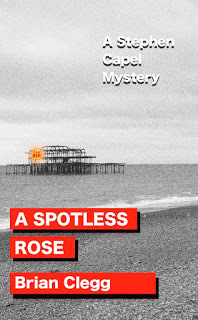 I am pleased to say that the third of my Stephen Capel murder mystery novels
A Spotless Rose
is now available as a paperback and on Kindle.
I am pleased to say that the third of my Stephen Capel murder mystery novels
A Spotless Rose
is now available as a paperback and on Kindle.In the sequel to A Lonely Height and A Timely Confession , vicar Stephen Capel is on his first holiday after joining his first parish in the village of Thornton Down. In Brighton with his girlfriend, Vicky Denning, Capel hopes to get away from it all. Taking a stroll on the beach, he sees a woman fall from the ruined pier. He rescues her, but discovers that she is dead - stabbed - and soon finds himself suspected of her murder. Each day, as Capel tries to untangle himself from suspicion, another woman dies. The race is on to prevent yet another death.
It may seem that I've been coming out with these books rather quickly - it's because the first three were written a number of years ago. They came close to publication, but were considered rather too mild for the blood-and-guts preferences of the time. Now, I think, they make an excellent antidote to Scandi-Noir.
There will be something of a pause before #4, though, as this is only partly written.
If you do decide to go for a copy (available via my website either from Amazon, or as signed copies direct from me), please do leave a review on Amazon - even if it's just a line or two.
Published on June 17, 2016 01:51
June 15, 2016
The curious paradox of the self-confirming Englishman
 At the weekend I was saddened to see someone post on Facebook:
At the weekend I was saddened to see someone post on Facebook:[the] EC debate has reinforced how out of tune I feel with any nationalistic sense of being "English"For me, this statement was a genuine paradox in the proper logical sense. Because the only people I know who are embarrassed by their nationality are English. I don't know a single Scottish or Welsh person who isn't proud to be - Scottish or Welsh. I delight in my part-Irish background. Yet there is something in the poor tortured English soul that produces a kind of national self-loathing. So bizarrely, by proclaiming that you don't feel English... you show how English you are.
It's time we grew up in England and realised that being proud of your nation is not the same as fascist-style Nationalism. People who assume this are falling into a classic either/or logic error. Such people assume that if you don't loathe your nationality you have to be a Nazi - but, of course, the vast majority of people in the world are very happy with their nationality and proclaim that to be the case. It's time we reclaimed our right to be English without being guilty about it.
Published on June 15, 2016 01:14
June 14, 2016
The PR Corner - issue #3
 I was always a fan of Pseud's Corner in Private Eye. These days, the most purple prose I receive is often in the form of press releases for books being offered for review. I will provide an irregular series of these, both for your entertainment and, I hope, as pointers of what not to do with the press releases for your own books.
I was always a fan of Pseud's Corner in Private Eye. These days, the most purple prose I receive is often in the form of press releases for books being offered for review. I will provide an irregular series of these, both for your entertainment and, I hope, as pointers of what not to do with the press releases for your own books. Note that the books themselves could be brilliant... or not. But a poor press release is unlikely to generate many reviews. Names will be omitted to protect the innocent and guilty alike.
I suspect the problems are fairly self-evident, but just in case here's a few key pointers to look out for:
Do critics really ask 'When is film coming?' [sic]Do readers want to be embroiled? Or just parboiled?So most writers don't really try with their first book?I can't see anything in the release that suggests this book 'redefines the YA/Adult crossover fantasy genre'.Fierce ability? Really?It has all the same old concepts, but doesn't succumb to... the same old concepts. Good trick.Is it a good thing it doesn't have a clear audience?Do readers want a book to be a hoot?It repeatedly tells us the book is 'unique in the market' but does not give any evidence of what makes it unique, instead reeling out the 'same old concepts.'And doesn't that last line fill us with joy?
[TITLE] : Blistering New YA/Adult Crossover Novel Redefines Fantasy Genre. Critics Ask: “When is Film Coming”?
X’s ‘[Title]' embroils readers in a land where danger, magic, quirky creatures and chillingly-vivid characters run amok. There’s nothing else like it on the market, with critics tipping the adventure as the perfect candidate for the big screen. In fact, one critic recently wrote, “Enter through the portal and be swept up in a whirlwind of a vividly described new world. X writes like a dream”.
FOR IMMEDIATE RELEASEUnited Kingdom – While most authors use their first release to do nothing but simply test the literary waters, X is rapidly proving that a debut novel also presents an opportunity to rival the bestsellers. In fact, X ‘[Title]’ is being praised by critics for totally redefining the YA/Adult crossover fantasy genre.It all comes down to the author’s fierce ability to defy convention and her refusal to succumb to the ‘same old’ concepts. Yes, her novel contains all of the unique, intricate creatures and characters fantasy fans crave, but with a narrative unlike anything else on the market.[...]“This novel was primarily written for both the young adult audience and adults, as the story’s culture and values transcend any single age group to make it a hoot for readers in any stage of their life,” explains X. “It’s all about retaining the hallmarks of the fantasy genre, while also breaking new ground to produce something that sits as totally unique in the market. It was no easy job, but I’m delighted with the final product.”
Continuing, “And remember, this is just the very start of the saga. The next book is currently on my writing desk and should be released later this year.”
Enjoyed this one? See PR Corner #2
Published on June 14, 2016 01:44
June 13, 2016
Data is like money
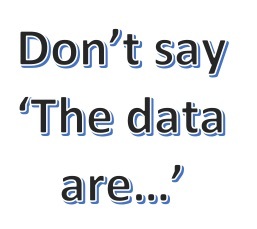 I am very fond of scientists, but I have to admit that their discipline tends to make them pedantic (I suspect even I can be occasionally) - which is fine when assessing science, but rubbish when thinking about use of English. Scientists should realise this. Suggesting language should have a fixed set of rules that always apply and never change is a bit like saying all species should be as they were 6,000 years ago and never change. Language is far more like biology than physics.
I am very fond of scientists, but I have to admit that their discipline tends to make them pedantic (I suspect even I can be occasionally) - which is fine when assessing science, but rubbish when thinking about use of English. Scientists should realise this. Suggesting language should have a fixed set of rules that always apply and never change is a bit like saying all species should be as they were 6,000 years ago and never change. Language is far more like biology than physics.The particular bit of scientific pedantry that gets my back up is the instance that the word 'data' should be treated as plural. So scientists will pedantically insist on writing 'the data support the hypothesis' rather than 'the data supports the hypothesis.' To every normal person, the scientists' version is clearly wrong. Because language evolves, and the way we use the word 'data' has evolved too.
I would argue that data has become the same kind of singular collective noun as money. The word 'money' usually refers to more than one thing and we use some plural forms with it - so we say 'I have some money' not 'I have a money'. But we also say 'The money is in the bank,' not 'The money are in the bank.'
This makes a huge amount of sense. There are very clear similarities with the way 'money' and 'data' are used as words. But the trouble with being a pedant is that you can stick with an outdated theory far longer than you should. So those who want data to be plural, scratch around for a justification and think they have found one. 'Ah,' they say, 'data has to be plural because it is a Latin word, the plural of datum.' But this is rubbish. Classical plural forms are decreasingly used in English, and have never been definitive. If you really wanted to be pedantic about Classical plurals - and even Fowler thought this was silly - the plural of octopus would be octopodes. Data has become a word we use for something that had nothing to do with its Latin roots.
No, you've lost this one scientists. Data, as a word, should work just like money does, and it's about time you switched away from this clumsy usage.
Published on June 13, 2016 00:59
June 9, 2016
How Marks and Spencer may be ripping you off
 There are some stores like Tesco and Asda that, frankly, we expect to deploy every sales trick in the book. But there are others, notably John Lewis/Waitrose and Marks & Spencer where you may pay a bit more, but you expect to get - and usually do get - ethical treatment. However, I may have just spotted the dirty tricks department at M&S in action.
There are some stores like Tesco and Asda that, frankly, we expect to deploy every sales trick in the book. But there are others, notably John Lewis/Waitrose and Marks & Spencer where you may pay a bit more, but you expect to get - and usually do get - ethical treatment. However, I may have just spotted the dirty tricks department at M&S in action.I was in a hurry and grabbed a two-pack of sausage rolls, taking them straight to the till. And didn't suspect anything until the server rang up £3 (he may have accidentally put them through twice, but even if that's true, there was clearly something odd going on.)
It was only then that I noticed that I had picked up gluten free sausage rolls. Now, looking at the packaging you might think it was obvious, but all I saw was 'Sausage rolls'.
So I went back and replaced them with ordinary sausage rolls - they were 75p for the two pack. So I nearly got hugely overcharged.
Like 99% of the population, I am not gluten intolerant - and like the rest of that 99% I should avoid gluten free food, which usually has more additives and always has more fat to provide some of the sticking power of natural gluten. (In this case, the ordinary sausage rolls only had 75% of the fat of the gluten free ones.) Let's be clear there are ZERO health benefits to eating gluten free if you aren't gluten intolerant, and significant negatives.
But why am I making a fuss when I picked up a pack that was clearly labelled? Because the gluten free sausage rolls were next to the ordinary ones, not in a separate gluten free section. Generally speaking, a separate gluten free section is the best solution for both shop and customer. For the shop it means less opportunity of confusion, and for the customer, if you are in the 1% of sufferers you can see where your bit is, if you are in the 99% who aren't, you can find the normal stuff.
As far as I can see, there is only one reason for putting the gluten free sausage rolls in with the ordinary ones. And that is because people in a hurry will do what I do, pick up gluten free sausage rolls from a 'normal food' section and pay extra. And if that is the reason, this really is a rip-off.
Published on June 09, 2016 00:28
June 8, 2016
Time to end literary snobbery
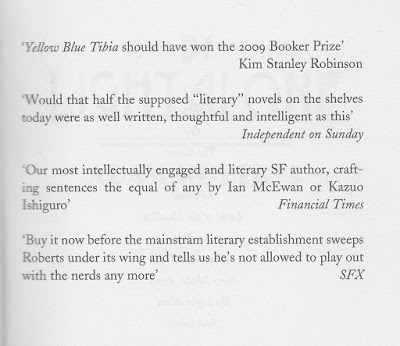 Perhaps because of my Northern working class family background, I struggle when presented with what appears to be pretentiousness. I know, for instance, that caviar is a horrible, salty waste of money, I prefer a good draught beer to wine with a meal, and I have real trouble with the literary scene.
Perhaps because of my Northern working class family background, I struggle when presented with what appears to be pretentiousness. I know, for instance, that caviar is a horrible, salty waste of money, I prefer a good draught beer to wine with a meal, and I have real trouble with the literary scene.The vast majority of the time I prefer to read genre fiction, whether crime or SF, rather than reading literary fiction. I'd go further - I think good genre writing is better fiction than most literary fiction. So I have real mixed feelings about seeing the quotes alongside in the Adam Roberts book By Light Alone, which I recently reviewed.
On the one hand I absolutely agree that Roberts is a brilliant writer. And I think it's true that the literary types (I would hardly describe them as mainstream (or even 'mainstram') will pick up on Roberts just as they did, for instance, with Ray Bradbury, and will do all their power to try to persuade themselves and the rest of us that because this is good writing, it's not really science fiction at all. However, I think it is a sad reflection of the nature of the literary establishment that they feel the need to do this. Roberts writes excellent fiction that makes you think - like many SF writers. And he writes science fiction.
After writing this I noticed in my review of Roberts' book The Thing Itself, I wrote 'This is the kind of science fiction that should be winning the Booker Prize. Simple as that.' It was an interesting echo of the comment above - but I ought to stress I'm not saying that Roberts' books should be considered literary fiction, but that prizes like the Booker should take in genre fiction, because it's so often better than the stuff they get excited over.
Published on June 08, 2016 00:56



